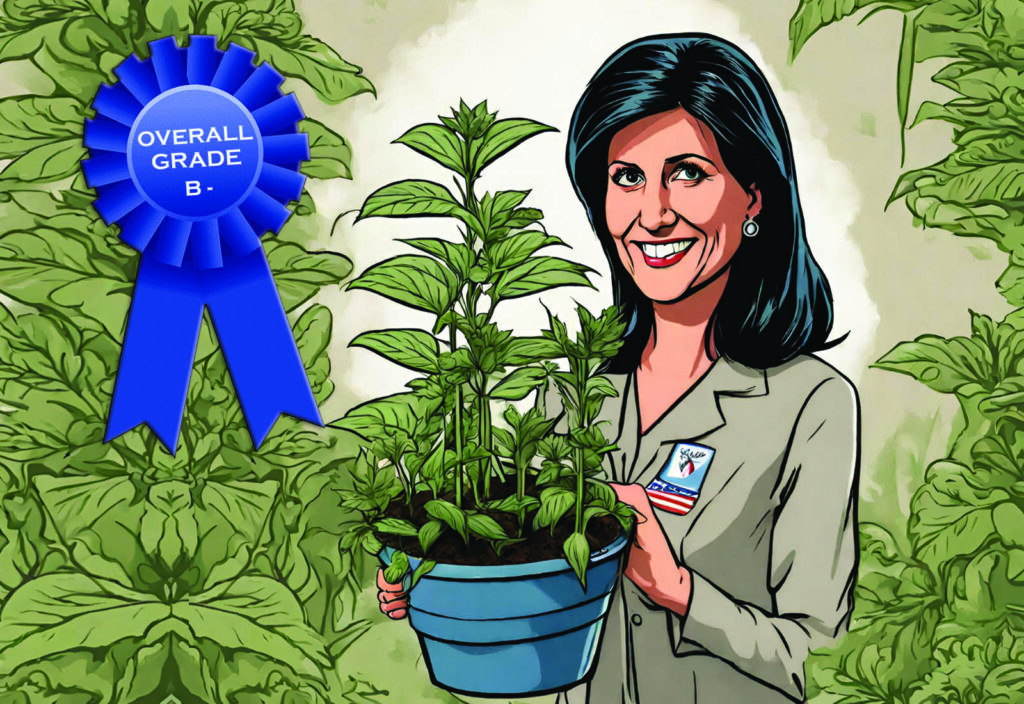Welcome to part three in our series on cannabis and those who wish to lead us. In the first two posts, we covered Joe Biden (we gave him a “C”) and Ron DeSantis (R.I.P.; we gave him a “C+”). Today’s subject is Republican candidate Nikki Haley. She’s still around as of this writing and I’m giving her a B-.
Overall Grade: B-
Haley’s position on cannabis is that she would “let the states decide.” At the federal level, she agrees with the recent Health and Human Services (HHS) re-scheduling recommendation, observing that she’d “go with the scientists” and that cannabis “obviously” doesn’t belong in the same category as heroin. Haley said these anodyne things recently at town hall events; Marijuana Moment has a good write-up here.
That story also mentions that Haley didn’t act or opine on cannabis while serving as a United Nations ambassador under Donald Trump (makes sense), and that she “doesn’t have an especially extensive cannabis background.” Haley did, however, sign a 2014 bill as South Carolina Governor to legalize hemp. For that I tip my hat.
In my view, Haley is sitting in a pretty typical Republican spot for 2024, which can be summarized as “states’ rights are best for marijuana” but “it’s not a federal priority.” To wit, Haley doesn’t appear to have commented on any of the federal legislative proposals floating around for cannabis reform. Her campaign website is also silent on cannabis policy (and every other policy).
One proposal that may square with Haley’s statements on cannabis is the Strengthening the Tenth Amendment Through Entrusting State (STATES) 2.0 Act. That revamped bill would undo federal criminalization of people acting in compliance with state cannabis programs, or Indian tribal law. On the other hand, maybe STATES 2.0 is a bit much for Haley, in that it would authorize interstate marijuana commerce. I don’t know.
Most likely, Haley hasn’t thought all that hard about cannabis policy. And isn’t very interested in the topic.
“Let the states decide” isn’t helping
I take issue with “let the states decide” politicians who also fail to promote a floor of federal legalization. Don’t get me wrong: it’s all well and good to let the states run their own regulatory experiments, independent of federal law (we call this “federalism”); but things get awkward when states legalize things that are prohibited under federal law (i.e. marijuana, whether on Schedule I or III). A state-licensed marijuana business simply cannot comply with the federal Controlled Substance Act.
Setting a federal floor would work for cannabis and is a common legislative approach. You see it with everything from the minimum wage to environmental legislation. In the former example, Congress decrees (apparently without shame) that “it’s prohibited to pay someone less than $7.25 per hour.” However, states are allowed to set higher minimums. We need this for cannabis. The federal government needs to say “cannabis is not prohibited under federal law” or “cannabis is not prohibited under federal law, but it is subject to the foregoing requirements.” And then allow states to regulate the plant as they see fit (where the states are not “preempted”).
In the very big picture, I commented in a recent webinar that, based on my experience lawyering in the cannabis space for way too long:
I’m coming around to a really basic, simple theory of cannabis being unregulable at the state level, given the state of federal law… I just think it’s impossible. I think these states are set up for failure and I can’t see any one state that I can honestly say is succeeding in the way that we’d like them to succeed.
Change needs to come from the top.
“I’ll go with the scientists” is a punt, not policy
I like science and the scientists, don’t get me wrong. In the context of cannabis, though, “follow the science” is too often a shibboleth for lazy thinkers. Here’s why: our federal legislators and policymakers don’t go with the science on other intoxicating (and harmful, and addictive) substances, starting with alcohol. If they did, alcohol would also be subject to federal prohibition. But it’s not; and policymakers are correct to have learned, and continue to understand, that society simply won’t tolerate that.
Yes, policymakers should listen to scientists and weight their findings well. But science isn’t policy, and there is a very good reason scientists work in labs and not the Capitol Campus. Science is a discipline of narrow considerations: the study of material phenomena. Just because the science may suggest that marijuana belongs on Schedule III, doesn’t mean politicians should ignore all other social implications of placing marijuana there. It wasn’t science that brought us to the Controlled Substances Act and its silly schedules, after all.
It is the purview and responsibility of policymakers to think big picture. Listen to the scientists, and then consider other critical factors to craft good policy.
Wrapping up with Nikki Haley
When a politician takes Nikki Haley’s position – i.e., “leaving things to the states”, or even “to scientists”– those politicians are ignoring a policy failure writ large across the country. We have regressive outcomes on everything from ongoing criminalization, to depressed and distorted state-level cannabis markets, to the epidemic of gas station weed from hemp. This is a sprawling policy failure of the federal government’s own making; states and scientists cannot fix it.
Still, I’m giving Nikki Haley a “B-“. She gets that grade because she: 1) is a Republican 2) doesn’t seem to have bad intentions 3) once signed a hemp bill and 4) is unemployed and can’t do much about cannabis anyway. Yes, I’m grading on a curve. It’s also unlikely that Haley will become President this fall. That’s probably just as well for cannabis advocates.
























